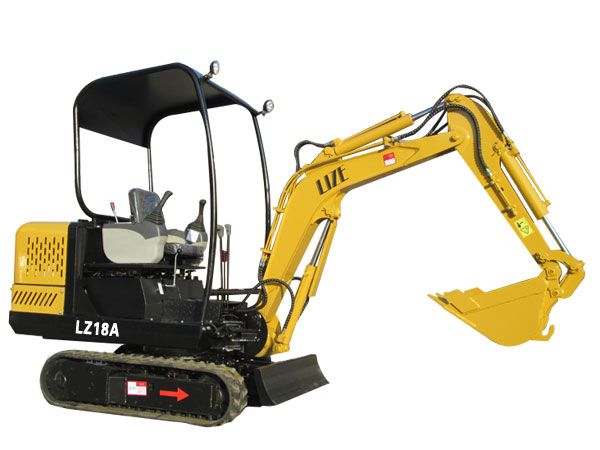Common diagnostic method for hydraulic system failure of micro excavators

Common diagnostic method for hydraulic system failure of micro excavators
The diagnosis of the failure of the hydraulic system of the construction machinery in the on-site construction is often limited by the site conditions, and it is required to be eliminated as soon as possible after the failure, so as not to affect the construction progress. This paper introduces several commonly used engineering machinery hydraulic system fault diagnosis methods for reference.
Visual inspection
For some simple faults, parts can be inspected by means of eye, hand, ear, and sniff. For example, through visual inspection, faults such as rupture, oil leakage, looseness and deformation can be found, so that the fittings can be repaired or replaced in time; the oil pipe (especially the hose) is held by hand, and there is vibration when the pressure oil flows. It feels like this, and there is no such phenomenon when there is no oil flowing or the pressure is too low. In addition, the hand touch can also be used to judge whether the lubrication of the hydraulic component with the mechanical transmission component is good, and the temperature of the component housing is changed by hand. If the component housing is overheated, the lubrication is poor; the ear can judge the mechanical component. Damage points and damage caused by damage, such as hydraulic pump suction, overflow valve opening, component issuance, etc., will produce abnormal sounds such as water shock or "water hammer"; some parts will be overheated, poorly lubricated and cavitation The odor is emitted by other reasons, and the point of failure can be judged by sniffing.
2. Change diagnostic method
This method should be used when there is a lack of diagnostic equipment at the maintenance site or if the components to be inspected are relatively inseparable and should not be disassembled. First remove the components that are suspected to be faulty, replace them with new ones or other components of the same type that are working properly, and test to see if the fault can be eliminated. For example, the hydraulic system working pressure of a Carter E200B excavator working device is suspected to be a failure of the main safety valve according to experience. The main safety valve on the same type of excavator on the site is replaced with the safety valve. Working properly, confirming that the suspicion is correct. Checking for faults with the replacement diagnostic method may be cumbersome to operate due to factors such as structural, on-site component storage or inconvenient disassembly, but it is small and easy for balancing valves, relief valves, check valves, etc. It is more convenient to use this method for disassembled components. The replacement diagnostic method can avoid the performance degradation of the hydraulic components due to blind disassembly. If the above-mentioned fault is not checked by the replacement method, the suspicious main safety valve is directly removed and disassembled. If the component has no problem, the performance may be affected after the restoration.
3. Instrument measurement inspection method
The meter measurement check method is to judge the fault point of the system by measuring the pressure, flow rate and oil temperature of each part of the hydraulic system. In the general on-site inspection, the failure of the hydraulic system often manifests as insufficient pressure and is easy to detect; while the detection of the flow is difficult, the flow can only be judged by the speed of the actuator. Therefore, in the field inspection, the method of detecting the system pressure is more used. For example, a Hitachi EX220-5 excavator found that walking to the right was delayed during work, and it was suspected that the left and right pressures of the walking system were uneven. When detecting the pressure of the walking system, it was found that the left side was 32 MPa and the right side was 26 MPa. After adjusting the pressure of the right side walking safety valve, the fault was eliminated. Another example is a US-made RS-425 road mixer, the failure phenomenon is walking weakness. During the test, it was found that when the hydraulic motor pressure was 10 MPa, the drive wheel did not move, that is, the motor did not rotate, which fully indicated that the internal leakage of the motor was serious. The dismantling of the motor found that the wear of the distribution plate and the plunger pair were very serious, indicating that the judgment was correct. Grinding the distribution plate, replacing the plunger pair, and everything is back to normal after the test.
4. Principle Reasoning
The basic principle of the hydraulic system of engineering machinery is made by using different hydraulic components and matching according to the combination of hydraulic system loops. When the fault occurs, the analysis and reasoning can be carried out according to this, and the location and cause of the fault are preliminarily determined. exclude. For example, there is a Carter E200B excavator that starts normally when there is no working load, and runs smoothly and accelerates strongly. However, under normal working load, the engine emits black smoke and the speed decreases. According to the situation when there is no working load, the fault of insufficient engine power can be eliminated, and only the cause can be found in the hydraulic system. According to the situation at the normal working load, it can be preliminarily judged that the engine is in an overload working state, and then it is necessary to analyze according to the working principle of the hydraulic pump. The hydraulic system of the excavator uses a dual pump constant power variable system.
Therefore, when the working device is working normally, that is, when the hydraulic pump output pressure reaches the rated value, the output flow rate is not adjusted to the matching value, and the engine is in an overloaded working state. The disassembled servo hydraulic cylinder found that the spring had been broken, thus causing the above failure. After the spring was replaced, the work returned to normal.
For the failure of the on-site hydraulic system, according to the working principle of the hydraulic system, the cause of the failure can be reasoned and analyzed on the system diagram in the order of the power component → control component → actuator. If an excavator boom is weak, from the principle analysis, the work is generally caused by the oil pressure drop or flow reduction. From the system diagram, the possible factors causing pressure drop or flow reduction are: first, the fuel tank, such as lack of oil, oil suction filter blockage, vent hole is not smooth; second, hydraulic pump leakage, such as hydraulic pump plunger The matching clearance is increased; the third is that the pressure of the main safety valve on the control valve is too low or the internal leakage is serious; the fourth is that the pressure of the hydraulic cylinder overload valve is too low or the internal leakage is serious; the fifth is that the returning oil path is not smooth. After considering these factors, some factors are excluded based on the existing inspection results, and the scope of the fault is narrowed until the fault point is found and excluded.
In the on-site hydraulic system fault diagnosis, according to the working principle of the system, it is necessary to master some rules or common sense; first, whether the fault process is a gradual change or a sudden change; if it is a gradual change, the original function is generally lost due to the change of the original size and the fit due to wear; It is a mutation, which is often caused by sudden damage to the parts, if the spring breaks, the seal is damaged, the moving parts are stuck or the dirt is clogged. The second is to distinguish whether it is a wearing part or a non-wearing part, or a moving part under high frequency and heavy load, or a hydraulic component that is prone to failure, such as a plunger pair of a hydraulic pump, a distribution plate pair, a variable servo and Hydraulic cylinders, etc. Components that are in low frequency, light load, or substantially static are less prone to failure, such as reversing valves, sequence valves, spool valves, etc., which are less prone to failure. After mastering these rules, it can play a positive role in quickly determining the fault location.
| Rear:Micro hydraulic excavator walking control and attention matters | Before:Main uses of small excavators and their application fields |







